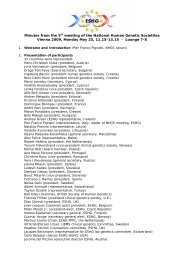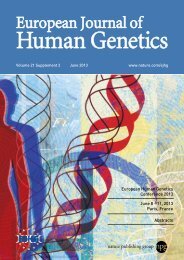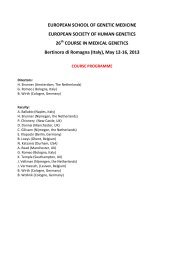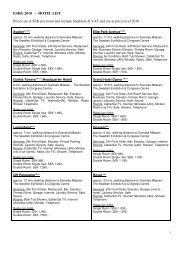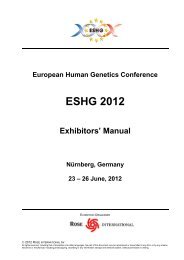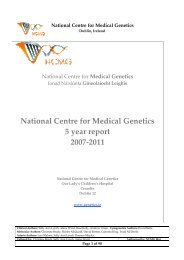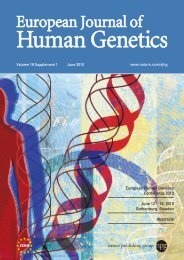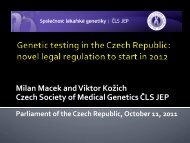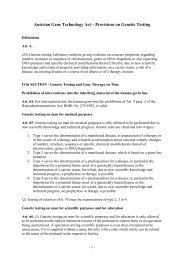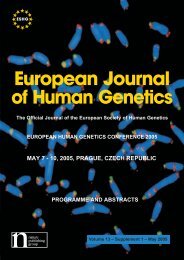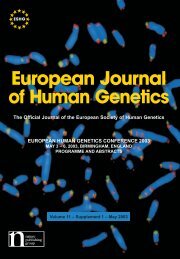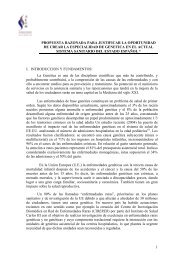2008 Barcelona - European Society of Human Genetics
2008 Barcelona - European Society of Human Genetics
2008 Barcelona - European Society of Human Genetics
Create successful ePaper yourself
Turn your PDF publications into a flip-book with our unique Google optimized e-Paper software.
Genetic counselling, education, genetic services, and public policy<br />
netic influences on illness, and recognize and manage more effectively<br />
the most common genetic problems, with improving identification and<br />
description <strong>of</strong> children affected by birth defects .<br />
Another challenge is facilitating the creation <strong>of</strong> support groups <strong>of</strong> rare<br />
diseases at a national level, demonstrating the needs <strong>of</strong> patients and<br />
groups; implementing access to the media, policymakers and the health<br />
systems . We struggle for the connection and interchange through an<br />
Ibero-American network <strong>of</strong> these alliances in each country .<br />
Chilean population is 15 million, infant mortality 8 per 1,000 live births,<br />
congenital malformations the second leading cause (33 .6%) . Abortion<br />
is prohibited by law .<br />
P09.30<br />
Estimation <strong>of</strong> patient’s understanding <strong>of</strong> genetic information<br />
received at genetic counselling. Results <strong>of</strong> pilot study.<br />
I. O. Sadelov1 , L. Y. Ivanova2 , I. V. Zhuravleva2 , V. L. Izhevskaya1 , E. K. Ginter1 ;<br />
1 2 Research centre for medical genetics, Moscow, Russian Federation, Institute<br />
<strong>of</strong> sociology, Moscow, Russian Federation.<br />
The pilot study <strong>of</strong> the 71 families with hereditary disease in a child<br />
or in one <strong>of</strong> spouses was carried out . It has been shown, that about<br />
72% <strong>of</strong> respondents (51/71) have completely understood the genetic<br />
information . In group <strong>of</strong> respondents with low (to 5%) repeated genetic<br />
risk correctly named value and category <strong>of</strong> risk 83% and 63%<br />
accordingly . The appreciable part <strong>of</strong> respondents in this group (36%)<br />
has overestimated the genetic risk . About 70% <strong>of</strong> respondents with<br />
high repeated risk could correctly specify the value, and about 75% <strong>of</strong><br />
them - a category <strong>of</strong> risk; 24% <strong>of</strong> them underestimated the risk . The<br />
full satisfaction with the results <strong>of</strong> consultation was expressed by 76<br />
% (54/71) <strong>of</strong> respondents . A rate <strong>of</strong> coincidence <strong>of</strong> expectations <strong>of</strong> a<br />
family before consultation and the results <strong>of</strong> consultation was estimated<br />
. The respondent’s satisfaction with the results <strong>of</strong> consultation was<br />
higher if their expectations were justified at least partially. This factor<br />
didn’t influence the understanding <strong>of</strong> the information<br />
P09.31<br />
Capacity building for the transfer <strong>of</strong> genetic/genomic knowledge<br />
into practice and prevention: the cAPABiLitY international<br />
collaborative network<br />
I. Nippert 1 , U. Krist<strong>of</strong>fersson 2 , J. Schmidtke 3 , A. Kent 4 , A. Christianson 5 , R.<br />
Raouf 6 , C. Barreiro 7 ;<br />
1 Universitaetsklinikum Muenster, Muenster, Germany, 2 Lunds University, Lund,<br />
Sweden, 3 Medizinische Hochschule Hannover, Hannover, Germany, 4 Genetic<br />
Interest Group, London, United Kingdom, 5 University <strong>of</strong> the Witwatersrand,<br />
Johannesburg, South Africa, 6 Ministry <strong>of</strong> Health, Cairo, Egypt, 7 Hospital de<br />
Pediatría SAMIC, Buenos Aires, Argentina.<br />
The number <strong>of</strong> genetic tests is growing each year and increasing<br />
knowledge about gene-disease associations will lead to new opportunities<br />
to apply genetic/genomic knowledge in practice and prevention .<br />
Before genetic tests are introduced into general practice the benefits <strong>of</strong><br />
their use must be evaluated . Worldwide, health care systems are facing<br />
the same challenges: 1) The need to develop an evidence-based<br />
evaluation process for genetic tests or other applications <strong>of</strong> genomic<br />
knowledge in transition from research into practice . 2) The need for<br />
capacity building to enable health care systems to make effective use<br />
<strong>of</strong> genetic/genomic applications with proven clinical utility .<br />
CAPABILITY is a 3-year model project developed by the Network <strong>of</strong><br />
Excellence: Genetic Testing in Europe - Network for test development,<br />
harmonization, validation and standardization <strong>of</strong> services (EuroGentest)<br />
and by leading experts from: Argentina, Egypt and South Africa,<br />
the latter being currently engaged in major development projects to<br />
integrate genetic services in primary care and prevention in their countries<br />
.<br />
CAPABILITY will:<br />
- develop an analytic framework for evidence-based genetic test evaluation,<br />
- identify priorities for capacity building by a systematic needs assessment<br />
survey and<br />
- validate the project’s approach by means <strong>of</strong> demonstration projects in<br />
Argentina, Egypt, Germany and South Africa .<br />
CAPABILITY’s overall objectives are to contribute to the efforts to<br />
establish and sustain a worldwide harmonisation process for quality<br />
standards for the integration <strong>of</strong> genetic test applications into practice<br />
and prevention .<br />
P09.32<br />
the lay people attitude towards predictive genetic testing in<br />
Russia<br />
V. V. Pogrebenkova, O. A. Makeeva, V. P. Puzyrev;<br />
Research Institute <strong>of</strong> Medical <strong>Genetics</strong>, Tomsk, Russian Federation.<br />
1400 Russian adults aged from 20 to 65 (73% women) were investigated<br />
through a specially developed questionnaire about their base<br />
knowledge and attitude towards predictive genetic testing . 66% <strong>of</strong><br />
respondents indicated they would prefer to know about their future<br />
diseases; the share <strong>of</strong> respondents expressing the positive attitude towards<br />
predictive testing increased (up to 85%)when people were told<br />
that the necessary prophylaxis will be in principal available . 89% <strong>of</strong><br />
respondents mentioned they are likely change their life style (give up<br />
with pernicious habits, keep to a diet or take medication) if they would<br />
be diagnosed as being at a high risk <strong>of</strong> a disease; the proportion <strong>of</strong><br />
women was higher if compared to men(91%vs 81) .<br />
Among the main reasons which can force people to undergo predictive<br />
genetic testing for common diseases the people’s concerns about their<br />
health status (39%)and practitioner’s recommendation (23%)have<br />
been denoted; at the same time the more detailed information about<br />
genetic testing and curiosity have been accounting for 18 and 16% respectively,<br />
while 4% <strong>of</strong> respondents would follow the family member’s<br />
or friend’s advice .<br />
When people were asked to range the particular common traits to<br />
which genetic testing could be mainly useful, they indicated oncological<br />
(17%),cardiovascular diseases (16%)and diabetes mellitus<br />
(11%)as the most advisable .<br />
In general, the overestimation <strong>of</strong> expectations related to genetic testing<br />
for disease predisposition is obvious in lay people in Russia . The<br />
positive attitude for predictive genetic testing did not depend from the<br />
level <strong>of</strong> education, while the awareness about emerging genetic technologies<br />
did .<br />
P09.33<br />
Risky genes, risky trust? Framing risk through trust and<br />
credibility markers in direct-to-consumer online genetic tests<br />
E. F. Einsiedel, R. M. Geransar;<br />
University <strong>of</strong> Calgary, Calgary, AB, Canada.<br />
This study looks at internet direct-to-consumer (DTC) advertising for<br />
genetic testing to assess the ways in which genetic risk information is<br />
framed to consumers, and examine the strategies employed to establish<br />
trust and credibility in this context. Representations <strong>of</strong> benefits and<br />
risks on 22 company websites were coded and themes were developed<br />
across advertisements for tests across a cross-section <strong>of</strong> health<br />
conditions . Two strategies were most frequently used by companies<br />
to frame risk: underlining the basis <strong>of</strong> the condition, <strong>of</strong>ten with genetic<br />
determinist and essentialist undertones, and stressing the commonality<br />
<strong>of</strong> the conditions . Major credibility and trust markers employed<br />
included indications <strong>of</strong> organizational pr<strong>of</strong>essional accreditation and<br />
expertise (<strong>of</strong>ten through credentials <strong>of</strong> company executives and staff) .<br />
The DTC ads examined provided limited, vague or inaccurate information<br />
about disease etiology and promoted tests for use in broader<br />
at-risk populations than is normally indicated in clinical practice . Implications<br />
<strong>of</strong> these trends for Canadian consumers and clinicians and for<br />
public policy are discussed .<br />
P09.34<br />
information on genetic testing in Europe: new services from<br />
Orphanet<br />
V. Lanneau 1 , I. Caron 1 , A. Rath 1 , M. Georget 1 , B. Urbero 1 , L. Desmet 2,3 , A.<br />
Corveleyn 2,3 , N. Nagels 2,3 , M. A. Morris 2,4 , E. Dequeker 2,3 , S. Aymé 1,2 ;<br />
1 Orphanet, Paris, France, 2 EuroGentest, Leuven, Belgium, 3 Department for<br />
<strong>Human</strong> <strong>Genetics</strong>, University <strong>of</strong> Leuven, Leuven, Belgium, 4 Service <strong>of</strong> Genetic<br />
Medicine, Geneva University Hospital, Geneva, Switzerland.<br />
Genetic tests are <strong>of</strong>fered internationally, through both public and private<br />
sectors . Doctors and biologists need to know which tests are<br />
available, where they are <strong>of</strong>fered and whether the identified laboratories<br />
meet quality standards .<br />
To fulfil this need, ten years ago, www.orpha.net started to set up a<br />
database <strong>of</strong> medical laboratories in the field <strong>of</strong> rare diseases. The data<br />
collection covered one country in 1997, 15 in 2003, 26 in 2006 and<br />
reaches 36 countries in <strong>2008</strong> . This effort was possible thanks to collaboration<br />
with EuroGentest NoE and resources from the EC DG for





